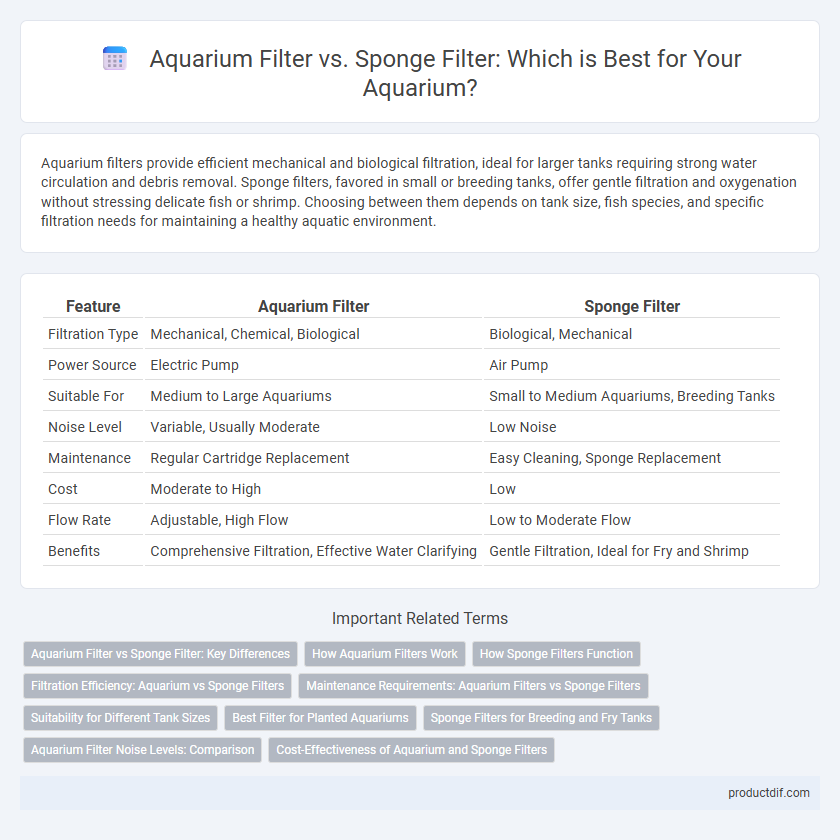Aquarium filters provide efficient mechanical and biological filtration, ideal for larger tanks requiring strong water circulation and debris removal. Sponge filters, favored in small or breeding tanks, offer gentle filtration and oxygenation without stressing delicate fish or shrimp. Choosing between them depends on tank size, fish species, and specific filtration needs for maintaining a healthy aquatic environment.
Table of Comparison
| Feature | Aquarium Filter | Sponge Filter |
|---|---|---|
| Filtration Type | Mechanical, Chemical, Biological | Biological, Mechanical |
| Power Source | Electric Pump | Air Pump |
| Suitable For | Medium to Large Aquariums | Small to Medium Aquariums, Breeding Tanks |
| Noise Level | Variable, Usually Moderate | Low Noise |
| Maintenance | Regular Cartridge Replacement | Easy Cleaning, Sponge Replacement |
| Cost | Moderate to High | Low |
| Flow Rate | Adjustable, High Flow | Low to Moderate Flow |
| Benefits | Comprehensive Filtration, Effective Water Clarifying | Gentle Filtration, Ideal for Fry and Shrimp |
Aquarium Filter vs Sponge Filter: Key Differences
Aquarium filters use mechanical, chemical, and biological filtration to maintain water quality, whereas sponge filters primarily rely on biological filtration through porous sponge material. Aquarium filters are typically powered and suitable for larger tanks, offering stronger water flow and debris removal, while sponge filters are air-powered, quieter, and ideal for small or breeding tanks due to gentle filtration. The choice depends on tank size, filtration needs, and noise tolerance, with aquarium filters providing comprehensive cleaning and sponge filters emphasizing safe, low-flow environments.
How Aquarium Filters Work
Aquarium filters work by mechanically trapping debris, chemically neutralizing contaminants, and biologically converting harmful ammonia and nitrites through beneficial bacteria colonies. Sponge filters operate mainly through biological filtration, using porous sponges to house these bacteria while providing gentle water flow and aeration. In contrast, standard aquarium filters often combine mechanical, chemical, and biological filtration processes within a single unit for more comprehensive water purification.
How Sponge Filters Function
Sponge filters function by drawing water through a porous sponge that traps debris and provides a large surface area for beneficial bacteria to colonize, aiding biological filtration. They are powered by an air pump that creates bubbles, which pull water through the sponge without strong currents, making them ideal for delicate fish or shrimp. This method ensures effective mechanical and biological filtration while maintaining gentle water flow in aquariums.
Filtration Efficiency: Aquarium vs Sponge Filters
Aquarium filters typically offer higher filtration efficiency by combining mechanical, chemical, and biological filtration, ensuring clearer water and healthier aquatic environments. Sponge filters excel in biological filtration by providing extensive surface area for beneficial bacteria, making them ideal for smaller tanks or breeding setups. While sponge filters are gentler and promote strong biological filtration, aquarium filters provide more comprehensive water purification for diverse aquarium ecosystems.
Maintenance Requirements: Aquarium Filters vs Sponge Filters
Aquarium filters require regular cleaning of mechanical, chemical, and biological media to maintain optimal water flow and filtration efficiency, often involving disassembly and rinsing under dechlorinated water. Sponge filters demand less intensive maintenance, typically needing gentle rinsing in tank water to preserve beneficial bacteria and prevent clogging, making them ideal for low-maintenance setups. Consistent upkeep of both filter types is essential to ensure healthy aquatic environments and clear water conditions.
Suitability for Different Tank Sizes
Aquarium filters are ideal for medium to large tanks due to their powerful filtration capacity and ability to maintain optimal water quality. Sponge filters suit small to medium tanks, providing gentle filtration and beneficial biological filtration without creating strong currents. Selecting the right filter depends on tank size, fish species, and filtration needs, ensuring a healthy aquatic environment.
Best Filter for Planted Aquariums
Aquarium filters offer advanced mechanical and biological filtration suitable for larger planted tanks, promoting clear water and healthy plant growth by efficiently removing debris and harmful substances. Sponge filters provide gentle water flow and excellent biological filtration, ideal for delicate plants and small aquariums that require minimal disturbance. Choosing the best filter for planted aquariums depends on tank size and plant sensitivity, with sponge filters favored for low-flow needs and aquarium filters preferred for enhanced water clarity and nutrient cycling.
Sponge Filters for Breeding and Fry Tanks
Sponge filters provide gentle filtration ideal for breeding and fry tanks, preventing delicate fry from being sucked into the filter while maintaining optimal water quality. Their porous structure promotes beneficial bacteria growth, enhancing biological filtration essential for young fish health. Compared to traditional aquarium filters, sponge filters offer low water flow and aeration, creating a safer environment for fry development and reducing stress.
Aquarium Filter Noise Levels: Comparison
Aquarium filters generally produce more noise compared to sponge filters due to their mechanical and power components. Sponge filters operate quietly by relying on air pumps and porous foam, which significantly reduces sound output, making them ideal for noise-sensitive environments. Noise levels of aquarium filters vary widely, but sponge filters consistently rank among the quietest options available for freshwater aquariums.
Cost-Effectiveness of Aquarium and Sponge Filters
Aquarium filters generally offer advanced filtration capabilities but come at a higher initial cost and require regular replacement parts, increasing long-term expenses. Sponge filters provide an affordable, low-maintenance option ideal for small tanks and breeding setups, as they use air-driven filtration without electricity or complex components. Choosing between the two depends on budget constraints and tank size, with sponge filters excelling in cost-effectiveness for basic filtration needs.
Aquarium Filter vs Sponge Filter Infographic

 productdif.com
productdif.com